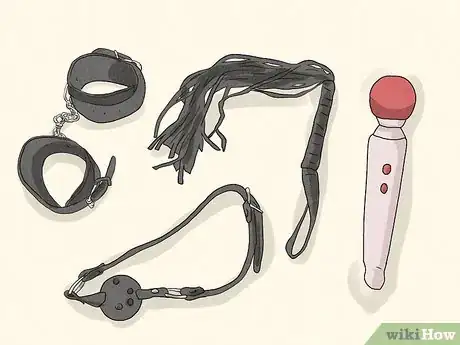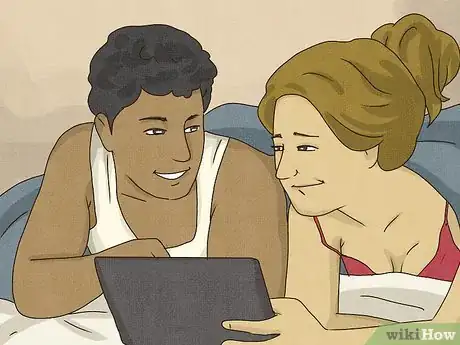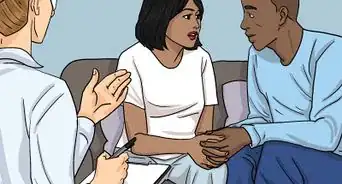This article was co-authored by Elvina Lui, MFT. Elvina Lui is a Licensed Marriage and Family Therapist specializing in relationship counseling based in the San Francisco Bay Area. Elvina received her Masters in Counseling from Western Seminary in 2007 and trained under the Asian Family Institute in San Francisco and the New Life Community Services in Santa Cruz. She has over 13 years of counseling experience and is trained in the harm reduction model.
There are 11 references cited in this article, which can be found at the bottom of the page.
This article has been viewed 382,122 times.
Whether you are in an intimate relationship already and you want to rekindle your sex life, or you want to take the step to be physically intimate with your partner for the first time, this can be daunting to both of you. There are a number of ways to get your partner to be more interested in sex with open communication being key.
Steps
Communicating Your Desires
-
1Try not to take it personally. Lots of couples have different sex drives. Just because your partner is not interested in sex as much as you are does not mean that he or she is not attracted to you.[1] In fact, there are lots of other reasons why your partner may not want to have sex as much as you do, such as:[2]
- hormone deficiencies
- feeling sick
- poor self-image
- fatigue
- stress
- low mood or depression
-
2Improve everyday communications with your partner.[3] Having a good emotional relationship with your partner may lead to a better sex life. Start taking time to talk to your partner as a friend. Show your interest in your partner’s happiness and well-being. Some good ways to improve communication include:[4]
- Asking about your partner’s day. Make time to sit down and chat with your partner at least once per day, such as during dinner or over your morning coffee. Say something like, “How was work?” or “Did you have a good time with your friends?” or “What do you have going on today?”
- Calling or texting during the day. Staying in touch throughout the day can also help to improve your communication. Try sending your partner a quick text or calling just to say hi. You might text your partner something like, “Thinking about you. What are you up to right now?” or call and say “Hey, how’s your day going so far?”
- Listening. Use good listening skills when your partner is talking to show that you are interested and engaged. For example, face your partner, make eye contact with your partner, nod your head, and make neutral statements to indicate your attention, such as “Yes,” “I see,” and “Go on.”
-
3Let your partner know how you feel. It is important to let your partner know that you would like to have sex more often and any other concerns that you have about your sexual relationship. Telling your partner these things can make it easier for you and your partner to come up with solutions to the problem.
- For example, you can start a conversation about your sex life by saying something like, "I feel closer to you when we have sex on a regular basis, but we haven't been doing that as much lately. Is everything okay?”
- Keep in mind that your partner might have had bad sexual experiences in the past with partners who were not as considerate or understanding. Be considerate and let her know she can tell you things without your judgment (if that is true of you).
-
4Be patient. Don't let your thoughts and actions be controlled by your wish for physical intimacy. Building a foundation for physical love takes time.[5] Consider backing off for a while to allow your partner time to be ready for sex on his or her own time.
- There will be many, many opportunities to have sex in a relationship, so in the grand scheme of things it's probably not all that big of a deal to have a bit less sex than you would ideally like.
Trying Toys and Techniques
-
1Schedule “erotic time.” Making room in your schedule for some intimate, sexy time with your partner may lead to more sex. Try setting aside 30 minutes per day where you and your partner will do something sexy together with the understanding that it does not have to lead to sex. It can just be a way to relax and feel intimate with your partner.
- For example, you could take a shower together after hitting the gym, light some candles and enjoy a glass of wine, give each other massages, or just lie in bed and talk for a while.
- Try not to push sex during this time. Just enjoy the intimacy with your partner and go with the flow. Remember that just because your partner is not in the mood for sex one night, that does not mean he or she will not be in the mood another night.
-
2Discuss using sex toys.[6] Talk to your partner about the possibility of introducing some sex toys or aids into the bedroom. Sex toys can be effective at increasing arousal and pleasure during and prior to sex.[7] For example, you might try:
- flavored lubricants
- vibrators
- sex positioning pillows, such as wedges
- a sex swing
- edible underwear
- anal beads
- ticklers
- restraints, such as fuzzy handcuffs or bondage gear
-
3Work with your partner to reach orgasm. You should not put pressure on your partner to have an orgasm, but you can ask if there is anything that you can do to make it easier for your partner to have an orgasm. You can also read up on some different techniques to increase your partner’s chances of reaching orgasm.[8]
- Keep in mind that many women need direct stimulation to the clitoris to reach orgasm, so licking, touching, caressing, or using a vibrator on this area can greatly increase the chances that she will orgasm. If your partner is a man, ask him what works for him. This can help ease his performance anxiety issues and may turn him on, too. [9]
- Touch your partner all over and kiss in places other than the lips (but also kiss the lips).
- Use lubricant to avoid painful sex or chafing.
- Change things up, whether it is a different position or a different room, don't always have sex exactly the same way.
- You can also look into topical products such as Zestra, which can may help to increase blood flow for women who suffer from female sexual arousal or interest disorders.
- Let your partner know that you find his or her body sexy. Sometimes people are self-conscious about the way they look, and this can turn them off from sex. Reassuring your partner that you find him or her attractive may make it easier for your partner to relax and get in the mood.
-
4Try role playing. Dressing up in costumes or even just engaging in a little fantasy can help to make sex more exciting. Talk to your partner about the possibility of introducing a little role playing into your sex life.
- For example, you could dress up as someone that you know your partner finds sexy, such as a celebrity, a certain type of professional, or as a fictional character.[10]
- Another option is to pretend you are new (or secret) lovers and meet in a hotel room at a designated time. You can also wear sunglasses, dark clothes, and even wigs for some extra intrigue.
Looking at Surrounding Issues
-
1Ask your partner if there is anything wrong. If this is a new relationship, she might have a physical problem she is ashamed of, such as an STD. Be open, kind, and caring to encourage your partner to share her feelings with you. Often, you can help her by simply having a supportive attitude.
- Be prepared to not react outwardly negatively to what she says. However, if you are not prepared to have sex with someone with an STD, you'll need to be upfront about this. If you find out she has an STD and want to break-off the relationship, the key is to make it about you having a problem, and not her.
-
2Work on your relationship as a whole. Physical intimacy is not possible if you are not emotionally close to each other already. [11]
- If you have been intimate before, but your partner seems no longer interested, think about problems you might be having on a non-physical basis. Do you fight a lot? Do you spend enough time together? Does your partner feel loved in your everyday interactions together? If any of these things might be lacking, work on them before trying to persuade your partner to have sex with you.
- If you have not yet had sex with your partner, make sure she feels comfortable around you and trusts you. Be considerate of her needs in a non-sexual way, i.e. make sure that she is enjoying the activities you choose for dates, and show interest in her daily life. Celebrate her successes and support her when she is having trouble with school, work, family issues, health problems, or just having a bad day.
-
3Discuss porn use. It may be that your partner has become dependent on pornography and so has less desire for real sex. Or, it may be that your partner wants to have more variety of sexual experiences with you. For example, she may want to watch pornography together before or during sex with you.[12]
- Having a non-judgmental conversation where you carefully broach the subject of pornography and how it should, if at all, fit into your sex life together, can at the least mean that you shared an intimate, possibly difficult-to-have conversation, which may itself make you two feel closer and increase her desire for sex.
-
4Change your typical behavior. There's a good chance that you and your partner have developed some classic roles regarding sex. You may be the one who typically tries to initiate sex and your partner is typically the one to deny. Doing more of the same will likely result in the same, frustrating outcome. [13] To try to change things up you can:
- Back off from initiating for a while and see what happens. Maybe your partner will feel less pressure and will initiate sex with you.
- Focus on your other needs. Because your partner has been declining sex, you may be so focused on it that you are neglecting other important aspects of your life. Start doing things that are important to you such as hobbies, spending time with friends, and doing other things that you care about.
-
5Repeat what works. Reflect on some of the times you and your partner have had some of your best sex and think about what was going on during that time. It may be that your partner tends to need a certain ambiance to be in the mood, so if you can re-create that, she may be more interested in having sex. [14] For example:
- Was it great after you had both done something exciting together?
- Was it great after you both opened up emotionally, exposing your vulnerabilities to one another?
-
6See a sex therapist. Let your partner know that it is important to you that you see a qualified professional to talk about your sex life.[15]
- If you are a woman and your male partner is the one with a lower sex drive, it is possible that he has low testosterone, and/or is suffering from impotence or performance anxiety. Be clear that you love him no matter what but that he will be happier seeing a qualified professional who can help.
- If you are a man and your female partner is the one with a lower sex drive, a sex therapist can help you two identify how to get your sex drives more on par, or help you work through compromises that leaves both of you happier.
Expert Q&A
Did you know you can get expert answers for this article?
Unlock expert answers by supporting wikiHow
-
QuestionWhat does it mean if my partner doesn't want to have sex?
 Elvina Lui, MFTElvina Lui is a Licensed Marriage and Family Therapist specializing in relationship counseling based in the San Francisco Bay Area. Elvina received her Masters in Counseling from Western Seminary in 2007 and trained under the Asian Family Institute in San Francisco and the New Life Community Services in Santa Cruz. She has over 13 years of counseling experience and is trained in the harm reduction model.
Elvina Lui, MFTElvina Lui is a Licensed Marriage and Family Therapist specializing in relationship counseling based in the San Francisco Bay Area. Elvina received her Masters in Counseling from Western Seminary in 2007 and trained under the Asian Family Institute in San Francisco and the New Life Community Services in Santa Cruz. She has over 13 years of counseling experience and is trained in the harm reduction model.
Marriage & Family Therapist
Warnings
- Don't let the huge amount of adult material on the internet fool you into believing that sex "belongs that way". It is fiction, and trying to reenact it in real life can seriously hurt your partner physically and emotionally. You will easily lose all her trust if you don't understand the difference between pornography and reality.⧼thumbs_response⧽
References
- ↑ Elvina Lui, MFT. Marriage & Family Therapist. Expert Interview. 15 March 2019.
- ↑ https://www.womansday.com/relationships/sex-tips/a967/8-reasons-he-doesnt-want-to-have-sex-91131/
- ↑ Elvina Lui, MFT. Marriage & Family Therapist. Expert Interview. 15 March 2019.
- ↑ https://leighnoren.com/human-sexuality-blog/can-emotions-affect-sex-drive-yes-and-heres-how/
- ↑ https://www.psychologytoday.com/blog/divorce-busting/201001/11-tips-the-spouse-lower-sex-drive
- ↑ Elvina Lui, MFT. Marriage & Family Therapist. Expert Interview. 15 March 2019.
- ↑ https://www.oprahdaily.com/life/relationships-love/a28427355/how-to-spice-up-sex-life-tips/
- ↑ https://flo.health/menstrual-cycle/sex/pleasure/how-to-orgasm-together
- ↑ https://www.psychologytoday.com/blog/all-about-sex/201203/mens-secret-sex-problem
- ↑ http://www.askmen.com/dating/love_tip/46_love_tip.html
- ↑ https://www.psychologytoday.com/blog/divorce-busting/201001/11-tips-the-spouse-lower-sex-drive
- ↑ https://www.smsna.org/patients/blog/can-pornography-improve-a-sexual-relationship
- ↑ https://www.psychologytoday.com/blog/divorce-busting/201001/9-tips-the-partner-higher-sex-drive
- ↑ https://www.psychologytoday.com/blog/divorce-busting/201001/9-tips-the-partner-higher-sex-drive
- ↑ https://www.self.com/story/signs-to-see-a-sex-therapist
















-Step-7.webp)





















-Step-7.webp)




































